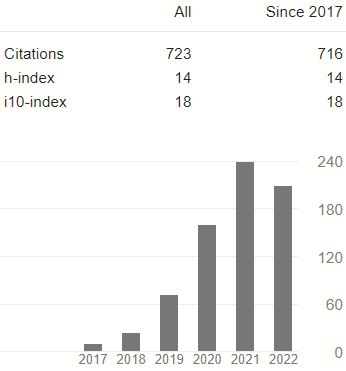PENGARUH INFORMASI LABA TERHADAP REAKSI PASAR DENGAN MANAJEMEN LABA RIIL DAN MANAJEMEN LABA AKRUAL SEBAGAI VARIABEL MODERASI
Studi Empiris Pada Perusahaan Manufaktur di Bursa Efek Indonesia Periode 2012--2015
DOI:
https://doi.org/10.25170/jara.v13i1.485Keywords:
accrual earnings management, earnings information, market reaction, real earnings managementAbstract
This study aims to investigate the effect of earnings information on market reaction with accrual and real earnings management as the moderating variables. The sample of this study is manufacturing companies listed in the Indonesia Stock Exchange in 2012-2015. Samples are collected by purposive sampling and resulted in 58 companies as the final sample. Data were analyzed using Moderated Regression Analysis (MRA) for testing hypothesis with significance level 5%. The statistical tool used is SPSS 22.The results of this study shown that market reacts positively significant toward earnings management and real earnings management in aggregate weaken the effect of earnings information toward market reaction. Real earnings management through discretionary expenses strengthen the effect of earnings information toward market reaction. Meanwhile, real earnings management through sales manipulation and overproduction, and accrual earnings management do not moderate the effect of earnings information toward market reaction.
References
Butar, S. B. (2014). Implikasi regulasi pasar modal terhadap motif manajemen laba: Pengujian berbasis teori pensinyalan. Jurnal Akuntansi dan Keuangan Indonesia, 11(1), 99-119.
Dewi, W. P. & Herusetya, A. (2015). Market response toward accrual earning management, real transactions, and strategic revenue recognition–earning management. Jurnal Akuntansi dan Keuangan, 17(2), 71-81.
Dwiadnyana, I. K. A. & Jati, I. K. (2014). Reaksi pasar atas manajemen laba pada pengumuman informasi laba. E-Jurnal Akuntansi Universitas Udayana, 7(1), 165-176.
Graham, J.R., Harvey, C.R., & Rajgopal, S., (2005). The economic implications of corporate financial reporting. Journal of Accounting and Economics, 40, 3–73.
Howe, J. S. & Houston, R. (2016). Earnings management, earnings surprise, and distressed firms. Accounting and Finance Research, 5 (1), 64-87.
Jayanthi, P. Y. & Putra, I. W. (2013). Manajemen laba dan respon pasar di sekitar pergantian CEO. E-Jurnal Akuntansi Universitas Udayana, 5(1), 147-162.
Jogiyanto, H. (2010). Teori portofolio dan analisis investasi (Edisi Ketujuh). Yogyakarta : BPFE.
Kieso, D. E., Weygandt, J. J., & Warfield, T. D. (2011). Intermediate accounting (IFRS ed. Vol.1). USA: John Wiley & Sons.
Kothari, S.P., Leone, A. J., & Wasley, C. E. (2005). Performance matched discretionary accrual measures. Journal of Accounting and Economics, 39, 163-197.
Lisa, O. (2012). Asimetri informasi dan manajemen laba: Suatu tinjauan dalam hubungan keagenan. Jurnal WIGA, 2 (1), 42-49.
Maharani. A. A. I. (2014). Respon pasar atas informasi laba (Replikasi Ball dan Brown 1968). E-Jurnal Akuntansi Universitas Udayana, 8(1), 83-93.
Mutia, E. (2012). Pengaruh informasi laba dan arus kas terhadap harga saham. Jurnal Akuntansi, 1(1), 12-22.
Ningsih, S. (2015). Earning management melalui aktivitas riil dan akrual. Jurnal Akuntansi dan Pajak,16(1), 55-66.
Nugraha, E. & Sopian, D. (2014). Ukuran KAP melalui manajemen laba dan pengaruhnya terhadap earnings response coefficient (Studi empiris pada perusahaan manufaktur Bursa Efek Indonesia). Prosiding Seminar Nasional Penelitian dan PKM Sosial, Ekonomi, dan Humaniora, 343-350.
Rahmah, N. A. & Sembiring, F. M. (2014). Suatu tinjauan teori keagenan: Asimetri informasi dalam praktik manajemen laba. Proceedings SNEB 2014, Bandung: Universitas Jenderal Achmad Yani.
Roychowdhury, S. (2006). Earning management through real activities manipulation. Journal of Accounting and Economics, 42, 335-370
Saerang, D. & Pontoh, W. (2011). Analisis pengaruh tingkat pengembalian aktiva terhadap harga saham perusahaan di Bursa Efek Indonesia (Studi pada saham perusahaan LQ-45 Periode 2004 s/d 2008). Jurnal Riset Akuntansi dan Auditing, 2(2), 3-17.
Sanjaya, I. P. S. & Saragih, M. F. (2012). The effect of real activity manipulation on accrual earnings management: The case in Indonesia Stock Exchange (IDX). Journal of Modern Accounting and Auditing, 8(9), 1291-1300.
Sari, G. P. (2015). Manipulasi laba riil: Upaya untuk menghindari kerugian. AKUISISI, 11 (2), 35-43.
Subekti, I. (2012). Accrual and real earnings management: One of the perspectives of prospect theory. Journal of Economics, Business, and Accountancy Ventura, 15(3), 443-456.
Sugiyono. (2015). Statistik untuk penelitian. Alfabeta: Bandung.
Suprihatin, S. & Tresnaningsih, E. (2013). Dampak konvergensi international financial reporting standards terhadap nilai relevan informasi akuntansi. Jurnal Akuntansi dan Keuangan Indonesia, 10(2), 171-183.
Susiani, D. E., & Marsudi, A. S. (2006),”Dampak Underperformance Setelah Penawaran Seasoned Equity Offerings”. AKSES: Jurnal Ekonomi dan Bisnis 1(2), 126-136.
Suwardjono. (2011). Teori akuntansi perekayasaan pelaporan keuangan (Edisi Ketiga). BPFE: Yogyakarta.
Tabassum, N., Kaleem, A., & Nazir, M. S. (2013). Impact of real earnings management on subsequent financial performance. Middle-East Journal of Scientific Research, 17 (4), 551-560.
Talebghasabi, M., Lak, L., & Lak, F. (2016). The relationship between discretionary and non-discretionary accruals and information efficiency in Tehran Stock Exchange. Report and Opinion, 8 (3), 34-38.
Trisnawati, R. & Sasongko, W. N. (2015). Tinjauan empiris model manajemen laba pada perusahaan go publik di Indonesia. The 2nd University Research Coloquium 2015, 227-241.
Trisnawati, R., Sasongko, W. N., & Puspitasari, N. (2016). Praktik manajemen laba pada Indeks JII dan LQ45 Bursa Efek Indonesia. The 3nd University Research Coloquium 2016, 71-85.
www.idx.co.id.
www.finance.yahoo.com.
Yusnita, H., Mulyadi, Erick. (2015). Pengaruh manajemen laba akrual dan aktivitas manajemen laba riil terhadap kinerja perusahaan. JAPFA, 3(1), 1-16.
Downloads
Published
Issue
Section
License
Authors who publish with this journal agree to the following terms:
- Authors retain copyright and grant the journal right of first publication with the work simultaneously licensed under a Creative Commons Attribution-ShareAlike 4.0 International License that allows others to share the work with an acknowledgment of the work's authorship and initial publication in this journal.
- Authors are able to enter into separate, additional contractual arrangements for the non-exclusive distribution of the journal's published version of the work (e.g., post it to an institutional repository or publish it in a book), with an acknowledgment of its initial publication in this journal.
- Authors are permitted and encouraged to post their work online (e.g., in institutional repositories or on their website) prior to and during the submission process, as it can lead to productive exchanges, as well as earlier and greater citation of published work.














